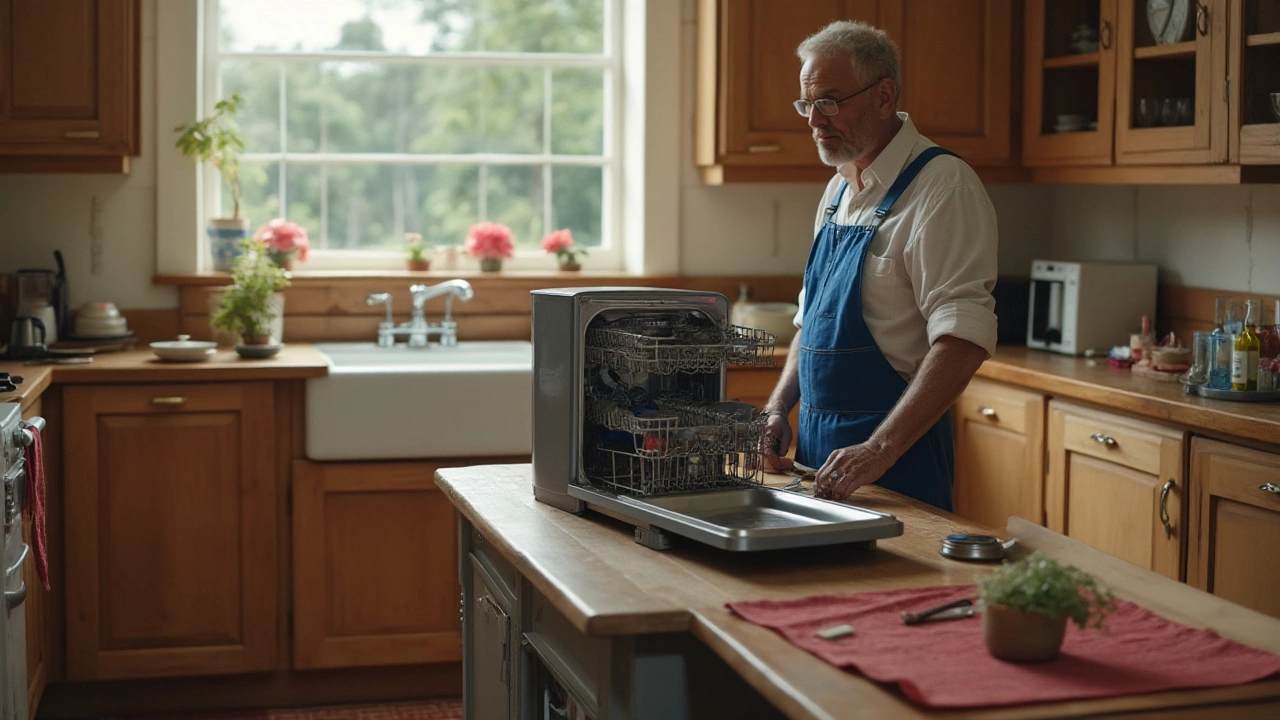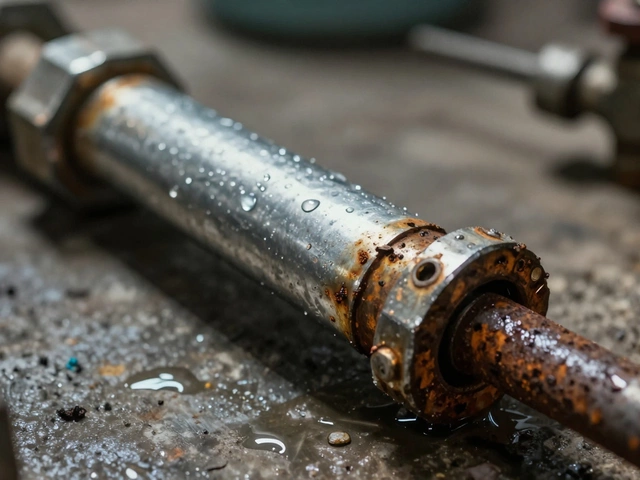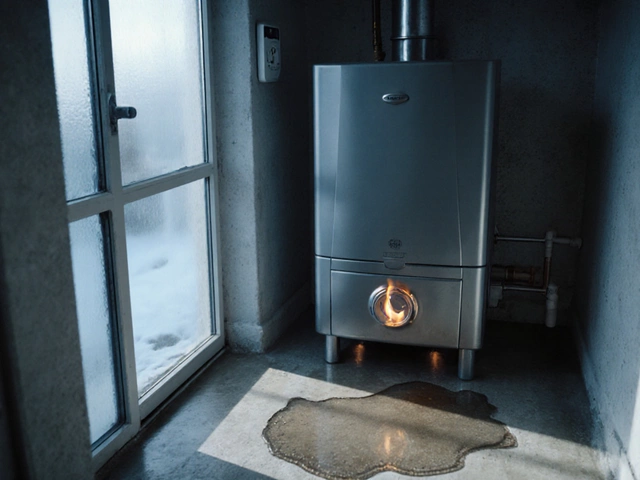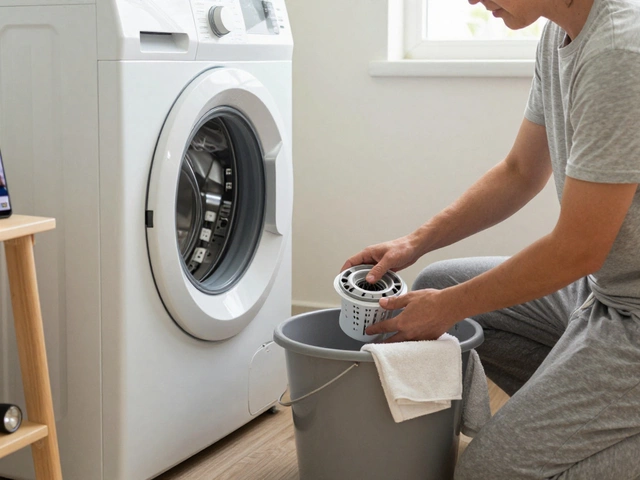It's a scenario many of us have faced: the dishwasher has called it quits, and now you're left with piles of dishes and a pressing decision. Do you roll up your sleeves for some elbow grease, call in a repair technician, or splurge on a shiny new model? Evaluating the worth of a repair isn't just about dollars and cents. It taps into the appliance's age, the nature of its hiccups, and future reliability.
Dishwashers, helpful yet temperamental, often show their age through leaks, strange noises, or simply refusing to start. But not every problem spells the end. While some issues might require a simple fix, others could signal the twilight of your trusty machine's life. Understanding these signs can save you headaches down the line.
- Common Issues with Dishwashers
- Cost of Repairs vs. Replacement
- When to Repair Your Dishwasher
- Tips for Extending Dishwasher Life
Common Issues with Dishwashers
When your beloved dishwasher starts acting up, it can throw the entire household routine into disarray. These trusty kitchen companions, integral for maintaining kitchen efficiency, can sometimes develop issues due to extended use, hard water, or just the passage of time. From leaks that threaten your pristine kitchen floors to stubbornly dirty dishes that make you question its entire purpose, understanding what these common issues are could potentially save you both time and money in the long haul. The first sign of trouble is often pesky leaks. Many dishwashers fall prey to this issue, which can result from anything from a worn-out door gasket to a malfunctioning pump or cracked hoses. Tracking down the source can prevent further damage and a bigger repair bill. Another regular culprit is drainage problems. If your dishwasher isn't draining properly, it might be due to a clogged filter or even food particles blocking the drainage system. Taking the time to regularly check and clean these parts can keep the appliance working smoothly.
But when we talk about strange noises, we’re tackling a whole different beast. Rattling, thuds, or clunks can be symptomatic of foreign objects lodged in the chopper blade or more severe motor issues that require professional intervention. As dishwashers age, their performance might also wane, leaving dishes not quite as spotless as you’d like. This drop in performance can often be tied to a malfunctioning spray arm or blocked jets, important components responsible for ensuring every corner of the machine is reached during its wash cycle. Did you know, according to a report from the Appliance Industry Association, nearly 20% of dishwasher maintenance is linked to blocked or broken spray arms?
"Regular maintenance can extend a dishwasher's life by at least three to five years," says appliance repair expert, Mark Stone. "Simple actions like cleaning filters or replacing worn gaskets go a long way."
Temperature control is another slight headache for some owners. This usually arises when the heating element is on the fritz, affecting both the drying capabilities of your machine and the effectiveness of the cleaning itself. Cold water spells trouble in removing grease and sanitizing your dishes effectively. And as if that weren’t enough, door latch failures can prevent your dishwasher from even starting. Luckily, these are often simple and inexpensive to fix compared to some of the more severe issues. While some people may have the knack for DIY repairs, other problems, such as electrical faults, can be best left to the experts. Knowing what issues you can handle yourself and what requires a trained professional can help you make informed decisions when faced with a dishwasher dilemma. These common problems aren’t merely annoyances. They’re often signs of your appliance letting you know it needs attention.

Cost of Repairs vs. Replacement
When your dishwasher malfunctions, weighing the cost of dishwasher repair against buying a new model is crucial. Often, the decision isn't as straightforward as comparing price tags. You want to avoid throwing money into an appliance that might soon need another fix. Yet, replacing a dishwasher isn't just a financial outlay; it often involves additional costs for delivery, installation, and possibly altering cabinetry. Before making a snap judgment, consider the average life expectancy of a dishwasher, which hovers around 9 to 12 years. If yours is relatively young, repairing might make more sense.
On average, repairing a dishwasher can range from $150 to $300, depending on the issue. Common problems like a faulty door latch or a clogged spray arm may even come under $100. Contrast this with a new dishwasher, which often starts at $400 and can easily climb into the thousands for high-end models. A handy rule of thumb suggests replacing the appliance if the repair is more than 50% of the cost of a new one. Yet, this isn't set in stone. Consider the environmental impact of discarding appliances and the benefits of newer models, like energy efficiency, which can offset costs in the long run.
Renowned appliance expert, Jonathan Maxwell, once said,
"Understanding the true cost of repair isn't just about the fix itself, but preserving an appliance's value over its lifetime."This insight is worth considering as dishwashers often have intricate systems. If a repair is likely to extend the appliance's life by a couple of years, and it fits within your budget, it can be a wise move. On the flip side, if the dishwasher has frequent breakdowns, committing to a new purchase might avoid hassle.
To help visualize when repair is preferred versus replacement, here's some interesting data:
| Age of Dishwasher | Recommended Action | Estimated Repair Cost |
|---|---|---|
| 0-5 years | Repair | $100-$150 |
| 5-10 years | Conditional Repair/Replacement | $150-$300 |
| 10+ years | Replacement | Over $300 |
Evaluating these factors can be key to making a well-informed decision. Don't hesitate to consult with knowledgeable repair technicians who can provide estimates and discuss potential outcomes. Ultimately, balancing practical considerations with your personal preferences should guide your choice towards the most cost-effective solutions for your situation.

When to Repair Your Dishwasher
Deciding to repair your dishwasher is often like solving a puzzle. There are multiple pieces to consider, and whether the effort is worth it often depends on several key factors. One of the first elements to assess is the age of the appliance. Most dishwashers have a lifespan of about 8 to 12 years. If your dishwasher is still within this range and it hasn't been plagued with frequent problems, repairing might be a worthwhile option. It’s also wise to check the brand and model, as some are known for longevity and might justify a repair investment.
Another crucial aspect is the nature and severity of the issue at hand. Minor problems, such as a clogged spray arm, broken door latch, or drain issue, can often be resolved quickly and inexpensively. These types of repairs might just require a simple replacement of a part that costs a fraction of a new machine. However, when the motor or pump gives out, the balance may tip toward replacement, as these repairs can be costly. A general rule is if a repair costs more than 50% of the price of a new dishwasher, replacement is the smarter financial move.
The frequency of past repairs can also influence your decision. If you're finding yourself on a first-name basis with your repair technician, hitting the reset button with a new appliance could save you time, stress, and surprise costs down the line. Consistent repairs might indicate deeper underlying issues or simply wear from age and use. On the other hand, an inaugural repair after years of faithful service might be worth the investment.
"A stitch in time saves nine," goes the old adage. Malcolm Barton from the National Appliance Repair Association advises, "Regular maintenance and timely repairs can often extend the life of an appliance beyond expectations, making repair not only sensible but financially savvy in many cases."
Consideration should also be given to the cost-effective solutions a repair might offer compared to upgrading to a more energy-efficient model. New models tend to have better energy ratings, which might save you money on utility bills. However, if your current model is still efficient enough, repairing can maintain your kitchen efficiency without a significant financial outlay.
Finally, it's sometimes useful to rely on the expertise of a trusted technician. A thorough diagnostic can reveal issues that aren't immediately apparent and can offer a clearer picture of what needs to be done. A technician’s opinion on whether a machine is worth repairing can be invaluable, providing you with the clarity needed to ensure your decision is the right one for your situation and budget.

Tips for Extending Dishwasher Life
Extending the life of your dishwasher is not just economically savvy but environmentally friendly too. When you take proper care of this essential kitchen appliance, you can avoid unnecessary expenses and reduce waste. Let's start with the basics—loading your dishwasher. It might sound trivial, but how you load dishes can have a huge impact. Ensuring plates and bowls are facing the right direction and not blocking the spray arms allows water and detergent to cover all surfaces effectively, preventing residue build-up over time. Regularly checking and cleaning the dishwasher’s filter can significantly enhance performance. Made to catch leftover food bits, filters need cleaning monthly to prevent clogs that overwork the motor and pumps. Appliance maintenance isn't too complex—it just needs consistent attention.
Use the Right Detergent
Choosing the right detergent is also crucial. Not all detergents are created equal, and using the wrong kind can lead to residue build-up and other long-term issues. Manufacturers often recommend specific types based on how their machines are designed to handle certain chemical compositions. Tablets or gel packs may be convenient, but make sure they are suited for your specific machine model to ensure optimal cleaning and minimal internal stress. Soft water requires less soap; using too much can create a soapy film on dishes, whereas with hard water, you may need slightly more to achieve the same effect. Incorporating rinse aids can further aid drying and prevent water spots.
"Regular maintenance, including using the right products, can easily add years to the lifespan of home appliances," says Dr. Susan Maytag, a renowned appliance expert.
Keep It Clean Inside and Out
Maintaining your dishwasher also involves a thorough clean of the interior and exterior parts. Once a month, run an empty cycle with a cup of distilled white vinegar instead of detergent. This simple step can effectively remove hard water deposits, mold, and bad odors. Baking soda can also be a good alternative. Simply sprinkle a cup at the bottom and run a short, hot cycle. This process will boost your appliance's cleaning efficiency, keeping it fresh. Clean the door seals with a soft cloth and soapy water to prevent them from decaying prematurely. Pay attention to the exterior buttons, which often get sticky due to continuous handling. An occasional gentle wipe-down helps in preventing grime build-up over the operational panels and keeps the entire unit looking spic and span.
Avoiding Overloads
Overloading is a common mistake that many make, hoping to save on water or detergent, but this could lead to inadequate cleaning and increased wear on your machine. Most modern dishwashers are designed to operate at optimal efficiency when not overcrowded, which allows free circulation of water and detergent and prevents mechanical strain. Paying attention to manufacturer instructions regarding load limits can extend the machine's operational life. A balanced load, without too much or too little weight, supports consistent performance and helps in preventing mechanical mishaps.
With some simple yet effective cost-effective solutions, you can ensure that your dishwasher runs smoothly for a decade or more. By integrating these tips into your routine, not only do you improve your kitchen's efficiency, but you also contribute to a sustainable way of living—an ever-important aspect in today's world.





